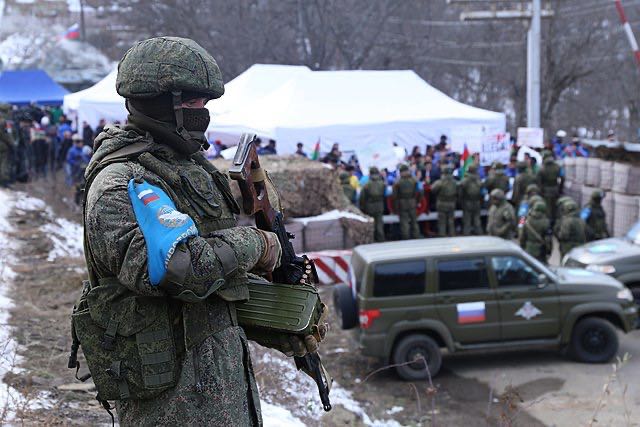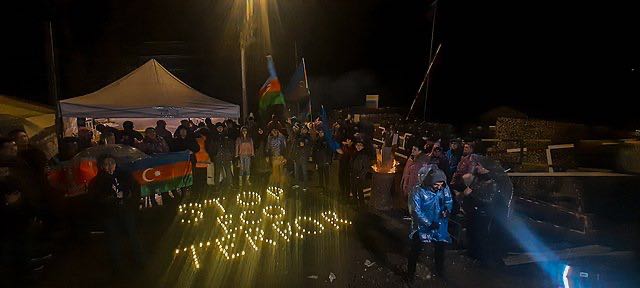The year 2022 was also disastrous for Russia's position in the South Causasus, says Caucasus-expert Neil Hauer for the Russian website Riddle Russia. Recent events in Nagorno-Karabakh are a sign that Russia is no longer able to protect its interests in the Caucasus. Even loyal vassal Armenia is losing faith in Putin's traditional support for Armenia in the conflict.
 A member of the Russian peacekeeping force in the Lachin corridor, Nagorno-Karabakh. Image Wikimedia.
A member of the Russian peacekeeping force in the Lachin corridor, Nagorno-Karabakh. Image Wikimedia.
by Neil Hauer
At the end of 2021, it seemed that things were on the up for Moscow. They had established a military presence on the territory of all three South Caucasian republics (as well as the region’s three unrecognized states) for the first time in over a decade. The Kremlin had recovered from Turkey kicking the door in on the Karabakh conflict in 2020 and had set up a vice grip on the region. It was hard to imagine many decisions in the Caucasus’s near future being made without the strong input, or at least tacit acceptance, of Moscow.
Fast forward just twelve months. After ten months of military disaster in Ukraine, Russia is no longer looking dominant in the Caucasus. In fact, today Russia might be at its weakest in the region since Georgia, Armenia and Azerbaijan gained their short-lived independence following the First World War a century ago.
The most instructive example of this comes via the region’s most active crisis, the Armenia-Azerbaijan conflict over Nagorno-Karabakh.
The first two months of 2022 passed quietly enough, with only a handful of ceasefire violations prior to the Russian invasion of Ukraine on February 24. But in March, Baku upped the ante, with its forces moving in to take control of the Karabakhi-held village of Parukh, directly under the eye of the Russian peacekeepers in the area.
This was Azerbaijan’s first test of Russia’s ability to control the situation in Karabakh and the region more broadly, and one in which Moscow’s forces did not come out looking good: they were unable to convince Azerbaijani troops to return to their previous positions and relinquish control of the village, despite the clear violation of the November 2020 trilateral agreement that ended the Second Karabakh War.
 Map of Nagorno-Karabakh (in white). Territories ceded to Azerbaijan in red, Lachin corridor in blue. Image Wikimedia.
Map of Nagorno-Karabakh (in white). Territories ceded to Azerbaijan in red, Lachin corridor in blue. Image Wikimedia.
'Russian NATO'
Worse was to follow. In August 2022, Azerbaijan again used force to further its objective of taking control of the entirety of Nagorno-Karabakh, attacking Karabakh Armenian positions in the Lachin corridor, the sole lifeline connecting Karabakh to Armenia and the outside world. In doing so, Baku managed to force the handover of the towns of Lachin (Berdzor in Armenian) and Zabukh (Aghanvo) a full year and a half before the timeframe stipulated in the 2020 ceasefire. Barely a month later, Azerbaijan launched a full-scale offensive — this time aimed not at Karabakh, but at Armenia proper. In two days of fighting, nearly 300 were confirmed killed as Azerbaijani troops occupied more parcels of Armenian territory.
Russian border guards active on the Armenian side of the frontier did nothing; one video appeared to show Russian troops leaving their positions at one border post prior to the Azeri advance. In the event, it was not Russian mediation that stopped the fighting as in years prior, but intense diplomacy and pressure from the US — a first for the conflict.
This was part of the greater crisis in confidence in Russia’s abilities and worthiness as a partner in Armenia in general. Russia and Armenia have strong formal military links: the two have had a mutual defence treaty since 1997 and are both members of the Collective Security Treaty Organization (CSTO), which also includes a mutual defence clause that, if invoked, obliges all other member states to contribute military means to defend the member in question.
During the Azerbaijani offensive in September, Armenia enacted precisely this article — only to be met with stalling and a decision to deploy merely a fact-finding mission by the Russian-dominated bloc. This was met by unprecedented protests against the CSTO in Yerevan, with members of the Armenian public calling for Armenia to withdraw from the bloc, while top Armenian officials openly stated their lack of confidence in the organization.
 Azerbaijani 'eco-activists' blocking the road in the Lachin corridor, December 2022. Image Wikimedia.
Azerbaijani 'eco-activists' blocking the road in the Lachin corridor, December 2022. Image Wikimedia.
Azerbaijani 'Eco-activists'
Finally, the most damning incident for Russia’s credibility in Armenia and the Karabakh conflict came at year’s end. On December 12, a group of Azerbaijani ‘eco-activists’ set up camp on the Lachin corridor, blocking the sole road connecting Karabakh with Armenia and the outside world. The protesters, transparently deployed by the Aliyev regime — Azerbaijan is a country in which genuine protest actions are dispersed violently by police within minutes — began a blockade that is ongoing for over a month now and shows no signs of abating.
Russian peacekeepers, who are supposed to guarantee the free passage of goods and vehicles along the route, have instead acted as effective security for the ‘protesters.’ The pushback from Armenian officials has been forceful: Pashinyan stated in a meeting with Putin himself that ‘it turns out the Lachin corridor is [in fact] not under the control of Russian peacekeepers,’ while Armenia’s Security Council chief Armen Grigoryan claimed that Armenia was under ‘strong pressure’ to join the Russian-Belarusian Union State, and that the corridor blockage was part of this.
'Even if the road reopens tomorrow, the damage has been done.'
The Russian inability or unwillingness to open the Lachin road has become the most dire flashpoint in Russian-Armenian relations to date, and even if the road reopens tomorrow, the damage has been done.
Against all of this, two other foreign actors became much more directly involved in Armenia: the US and France. Washington undertook intense diplomatic activity in the wake of the September fighting, with US Secretary of State Anthony Blinken and National Security Advisor Jake Sullivan calling Pashinyan and Aliyev near-daily for weeks to maintain the fragile ceasefire. Top Armenian officials, meanwhile, spent extended stints in the US this year, with both Foreign Minister Ararat Mirzoyan and Defence Minister Suren Papikyan making multi-week trips there, to say nothing of their many visits to France as well.
The crowning moment of this effort was the September 18 visit of House Speaker Nancy Pelosi to Yerevan, in which she delivered forceful remarks against Azerbaijan’s aggression, naming Armenia alongside Taiwan and Ukraine in stating that the world ‘must choose democracy [over] autocracy.’ These growing ties have not yet produced any firm commitments in the form of additional military aid or cooperation (although this is under discussion), but Armenia did make its first purchase of military equipment from India this year, buying $ 250 million of rocket artillery systems. Taken together, this all constitutes a decline of relative Russian power in Armenia to a degree that would have seemed unthinkable just a year ago.
 American House Speaker Nancy Pelosi during a visit to Yerevan, September 2022.
American House Speaker Nancy Pelosi during a visit to Yerevan, September 2022.
Things hardly went better for Moscow in the rest of the region, either, including with the other main party to the Karabakh conflict: Azerbaijan. While Baku officially moved closer to Russia this year, signing a treaty of alliance with Moscow literally two days before its invasion of Ukraine, the reality is more nuanced. Ilham Aliyev has sought to cast Russia as one of Azerbaijan’s main boogeymen, the hidden hand seeking to embolden Karabakh separatists and destabilize the ‘peace process,’ such as it is, with Armenia.
The targeting of Ruben Vardanyan, the Armenian-origin oligarch who gave up his Russian citizenship and moved to Karabakh to serve as state minister in Stepanakert’s government, as a Kremlin agent sent to derail peace talks with Yerevan is a prime example.
Moscow has visibly, and rather humiliatingly given up its traditional position as regional power broker, and has lost much of its leverage over Baku, in many ways now needing Azerbaijan more than Azerbaijan needs Russia. With few friends in the world left, Russia has been loath to take any steps that might antagonize its small southern neighbor, instead enduring numerous challenges to its peacekeepers in Karabakh that have made them look helpless.
As Russia relies on new gas deals with Azerbaijan to help effectively launder a portion of its gas in sales to Europe, it is now Aliyev that is left holding many of the cards in his relationship with Putin.
Moscow has visibly, and rather humiliatingly, given up its traditional position as regional power broker
Georgia, Abkhazia and South Ossetia
The course of Russian influence in the final South Caucasian state has been less dramatic, but little more reassuring to Moscow. In Georgia, the ruling Georgian Dream party has gone far out of its way to avoid any possible antagonism of the Kremlin, to a degree that has become scandalous among the Georgian population (perhaps the most anti-Russian anywhere outside of Ukraine).
While Georgia’s leaders, including its gray cardinal and de facto helmsman Bidzina Ivanishvili, have henceforth avoided providing nearly any support to Ukraine, they remain at least publicly committed to Georgia’s accession to the EU.
More tangible for Russia’s leverage in the region has been its military presence in the Russian-controlled breakaway states of Abkhazia and South Ossetia. In Abkhazia, over three-quarters of Russia’s military equipment stationed in the territory had been sent to Ukraine by May, while another well-informed analyst told the author that ‘everything’ had been transferred out of Abkhazia, resulting in fear among the local populace over any attempt by Georgia to take advantage.
Russia has also recruited heavily from among South Ossetia’s population (which totals perhaps 30,000 in all) for its operations in Ukraine, resulting in unrest as deserting fighters angrily questioned South Ossetia’s then-president. Faith in Russia’s ability as a security guarantor has been shaken in Sukhumi and Tskhinvali for the first time since Russia’s de facto occupation of both regions in 2008.
The picture as it stands, then, is a dire one for Russia in the South Caucasus, especially as nothing related to this situation is likely to improve anytime soon. As Russia’s invasion of Ukraine continues to falter, demanding more and more of the Kremlin’s resources and attention, Moscow will struggle to maintain its current weakened level of influence in the region and not slip even further.
Instead, as the embers of rebellion begin to burn again amongst the reconstituted Chechen separatist formations now active and growing in Ukraine, Putin’s grip on either side of the Caucasus mountains may begin to fray in 2023.
This article was first published on Riddle Russia.
